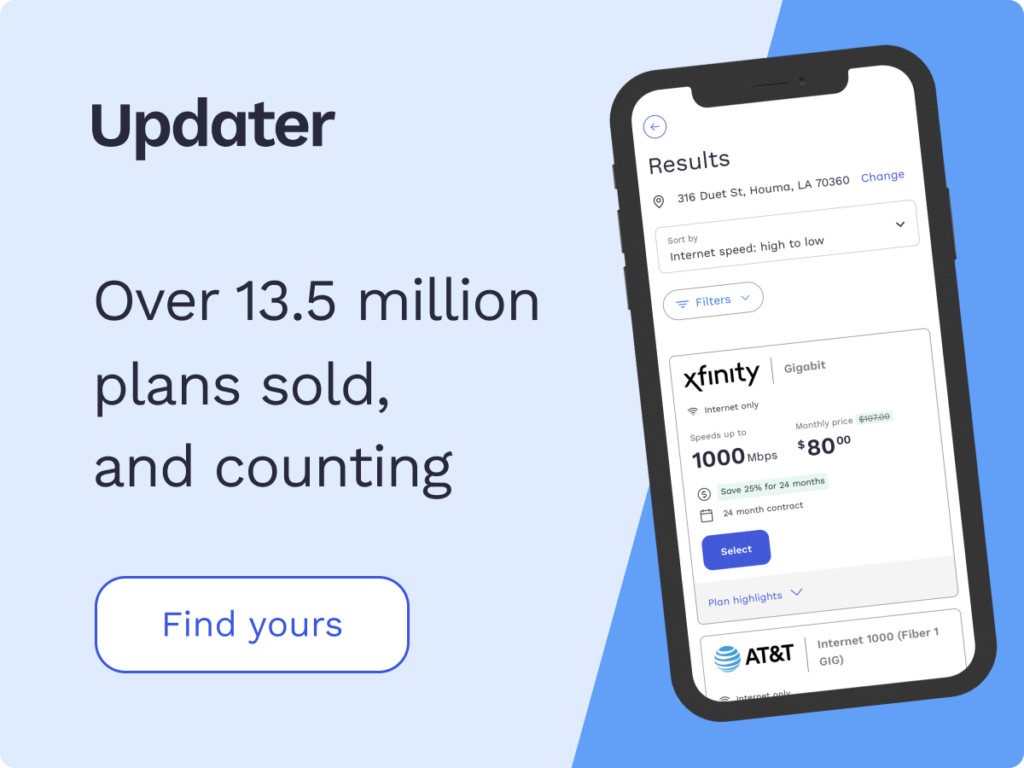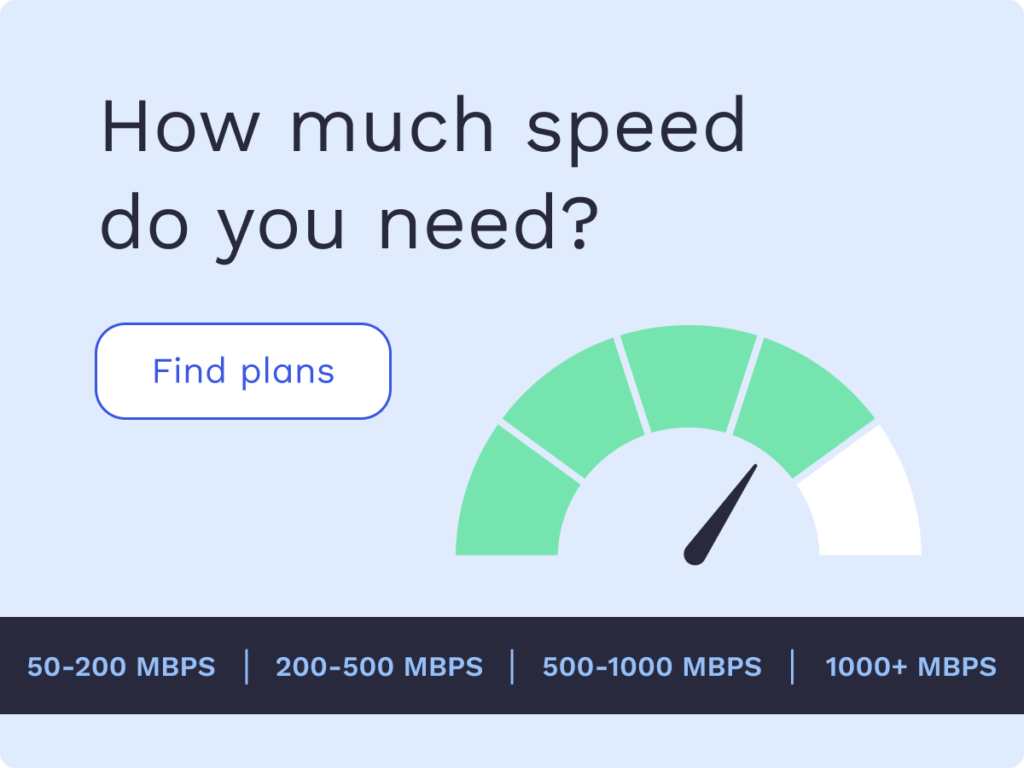What’s the Best Option for Prepaid Internet?

Curious what internet and TV plans are available locally?
Enter your address to find out what providers and plans are available to you.
Do you move fairly often, prefer to avoid being tied into contracts, or just need affordable internet service? If so, a prepaid internet option may be the right choice for you. While the availability of prepaid internet service providers will vary depending on where you live, your options may include some of the most respected prepaid internet providers include Verizon, Xfinity, and Cox.
If you’re unsure which prepaid ISP is the best fit for you, gathering information about options is an excellent place to start. We’ve broken down key details of each service provider so that you can make an informed decision.
The big players
One of the benefits of prepaid internet is that you’re not locked into a contract. This makes prepaid internet great for college students or professionals who may need to relocate temporarily. Additionally, people who need to follow a strict budget may find the low cost of prepaid internet very attractive. As you’re considering various prepaid internet options, this summary can aid in your decision-making process.
Verizon prepaid internet service offers three tiers of prepaid plans ranging from 100Mbps (starting at $39.99/month) to 940Mbps (starting at $79.99/month). While the lowest speed works well for streaming on up to 5 smart devices at once, the 940Mbps plan is likely a better fit for households with avid gamers and others who want lightning-fast speed for more than ten devices.
Verizon also has a middle-tier option that provides download speeds up to 300Mbps which works well for five to nine devices and starts at $59.99/month. While all three options require no contract, no credit check, and no deposit, there may be a $199 router purchase required. You can save on this fee if you own or buy a compatible modem, but that means you won’t be able to seek technical support from Verizon for modem issues. You’ll also need to pay a $99.99 setup fee (which is on the pricier side when compared to other options.)
Xfinity prepaid internet costs $45 for the first 30 days, with a one-time modem fee of $35. You must use the wireless gateway provided in the Xfinity starter kit instead of using your own. Xfinity will provide your home with download speeds up to 50Mbps, which is enough for up to four devices to stream movies, listen to music, and handle all of your internet browsing needs. After the first month, you can change your payment to $15 every 7 days, or continue paying $45 every 30 days. This plan requires self-installation, so you won’t have to pay installation fees.
Cox prepaid internet offers reliable prepaid service with minimal setup fees. Cox’s Straight Up Internet option is $50/month with a three-year price guarantee. This plan features download speeds up to 50Mbps, which is great for two to four devices. The biggest perk of Cox’s home internet service is that the modem is included at no cost and you can self-install to avoid installation fees.
Key considerations
When choosing a prepaid internet provider there are a few key questions to consider. How much speed does your household need? Are there additional equipment fees? And what about the cost of installation? Understanding the answers to these questions will help you make a more informed decision.
Choosing the right speed
In general, download speeds of 25-50Mbps are enough to support up to 4 people who video-conference and stream movies on multiple devices at once. If you have an online gamer in the house who doesn’t want to twiddle their thumbs for a few hours waiting for a game to download, you should consider plans with download speeds closer to 100Mbps. And if your household has one or more devices streaming movies and a gamer (or two) looking for the smoothest experience, download speeds of 300Mbps and up are optimal according to US News & World Report.
Between these three ISPs, Verizon is ahead of the pack in terms of the fastest available speed for prepaid subscribers. However, it’s important to consider other start-up costs as well since they can significantly impact the overall cost of service.
Equipment fees
Knowing you can afford the monthly cost of service is one thing, having the ability to cover all of the up-front costs is quite another. All three of these ISPs require a modem in order to connect to their service, but there are big differences in costs:*
- Verizon prepaid internet modem: $199 one-time fee, which you won’t need to pay if you can provide your own, compatible modem.
- Xfinity prepaid internet modem: $35 one-time fee, which is mandatory.
- Cox prepaid internet modem: No charge.
Installation/setup fees
Another important aspect of choosing a prepaid internet provider is determining if the ISP requires an installation or setup fee when activating a new service.*
- Verizon requires a one-time setup fee of $99.99 before installation which must be prepaid with your first month of service. However, they do offer a credit on your first month’s bill equal to your monthly plan amount if you choose to purchase a router from them. Other taxes and fees may apply.
- The Xfinity modem can be self-installed therefore there are no installation fees, but other taxes and fees may apply.
- The Cox modem can be self-installed therefore there are no installation fees, but other taxes and fees may apply.
What others are saying
Opinions vary when it comes to which ISP provides the best prepaid internet service. However, Verizon, Xfinity, and Cox all receive high marks in reviews from industry leaders.
Verizon
According to CNET, Verizon earns high marks for offering multiple prepaid options, including a gigabit plan. While pricing is comparable to standard Verizon Fios plans, speeds on the lower tier plans are somewhat slower. If you can work through the high start-up costs, the monthly fees of $40 for 100Mbps and $60 for 300Mbps are quite reasonable.
Xfinity
Although it only has one plan, Xfinity’s option for weekly payments is a plus for anyone who needs short-term internet service, according to CNET. Xfinity’s autopay program takes the hassle out of weekly payments, making it easy for college students, out-of-state visitors, and people with limited income to stay connected. Another endorsement for Xfinity: It ranked #1 on the U.S. News & World Report listing of Best Prepaid Internet Providers.
Cox
A recent review from U.S. News & World Report ranked Cox second in their list of Best Prepaid Internet Providers of 2022. In a separate full review of Cox internet services, the publication praised Cox prepaid internet as “a good option for anyone who is looking for a no-strings, no-frills service.”
Prepaid internet FAQs
Do I have to have a checking account to qualify?
Among the three prepaid home internet providers that we’ve highlighted, all three ISPs require you to prepay and set up auto-pay using a debit card or checking account only in order to qualify (no credit cards).
Do I need to prepay a deposit?
Though in some cases other providers may require a deposit, Verizon, Xfinity, and Cox prepaid internet plans do not currently require one. However, you will need to prepay the service every month so factor this into your monthly budget.
How do I know what prepaid internet options are available at my address?
If you’re not sure what options are available, we can help. Simply enter your address below to find out what providers are available to you.
*Pricing varies by location and availability. Speeds may vary. All prices subject to change; for current pricing and availability visit our internet service page. Prices as of 1/24/22.
Disclosure | Updater articles are based on our own data and research, independent from partner relationships. We are not compensated by partners for information and opinions presented here. Our Editorial Terms of Service can be found here.
Curious what internet and TV plans are available locally?
Enter your address to find out what providers and plans are available to you.
Internet and TV tips
Switching providers and don’t know where to start? We can help.














